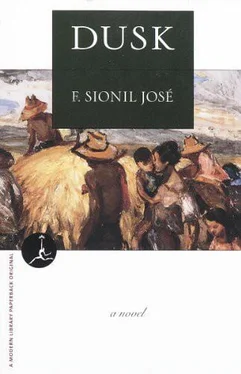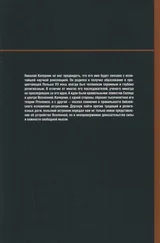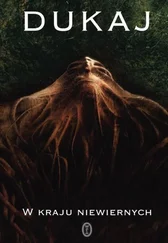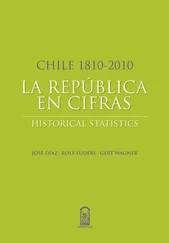Istak looked at his bare feet, at the shiny wooden floor. Was he the epitome of virtue because he was poor? How had it been in the village? There was foul gossip and cussedness anywhere in the world where small men had to think of their stomachs first before thinking about others. “The poor are not always virtuous, Apo,” he mumbled.
“Ah, but I did not say they are.” The Cripple became vibrant again. “What I do say is this: it is more difficult for the poor to be virtuous. When you are hungry and you steal a ganta of rice, that is not a crime; but when you are rich and you steal gold, is that not despicable? In this war, hundreds have died with honor, but I also know that some have already profited by their professions of patriotism. When this is all over, we will know who among the ilustrados have enriched themselves with the funds that should have gone for the purchase of guns, food, medicine for our soldiers. We will know who betrayed the revolution to the Americans. And because we are Filipinos, we may even proclaim these thieves as patriots. Patriots don’t become rich, Eustaquio.” The Cripple raised his hand in a gesture of futility and for the first time, Istak pitied him, his infirmity, his incapacity to express himself beyond words, in deeds that would bespeak iron physical courage as well.
What could a farmer like him do? Had the lives of people really changed during all the years that salvation was offered by the priests? If the revolution succeeded, what assurance was there that his life would change? Would brown rulers be different from the Spaniards? Would it not be worth waiting to find out what kind of rulers the Americans would be? He did not know much about America, but he had read about Lincoln and how he had freed the slaves. Surely, there must be some redeeming virtue in a nation which produced such a man.
“I don’t want to make you angry, Apo,” Istak said clearly. “All that I can look after is my own farm, serve those who seek me when they are sick. I have my children to look after so that they will not know what hunger is.”
The Cripple bowed as if enveloped in thought and for some time he did not speak. Darkness deepened, dishes clattered in the nearby kitchen, mice scurried in the attic, a dog howled somewhere in the vastness of the night. The Cripple spoke again. “I understand only too well what you are trying to say. That you are a farmer? Or that you are Ilokano? And if I ask you, what is under your skin, inside your skull, do not tell me it is blood and flesh and brains!” His gaze turned to the sky studded with stars and as if he had reached out for one and held it out to the farmer, his words took shape again, crystal-clear, lucid. “Don’t ever be a patriot, Eustaquio. Those who think they are or will be delude themselves. Patriotism is selfless. And it is not the generals who are the bravest — they usually have the means to stay away from the battle and thereby lengthen their lives. The bravest are usually those whom we do not know or hear about, those anonymous men who dig the trenches, who produce the food. They are the corpus — you understand that word — the body and also the soul of a nation. Eustaquio, my words are just words, but all through history — and you have studied it — it has always been the many faceless men, those foot soldiers, who have suffered most, who have died. It is they who make a nation.”
*The Filipinos usually coin nicknames (often terms of endearment) from a person’s physical attributes. “Kalbo” (“bald”) is the name given to a man by people who know him. President Ramos is called “Tabaco” because of the unlit cigar always clamped in his mouth. A fat boss will be called “Taba” (“fat”) by everyone in his office, although not to his face.
My concern is here in this land that I have cleared. Yes, my house is small — a typhoon can destroy it. I have no weapons to defend it against the Americans, who have everything. I will welcome them to partake of my food, and if they will command me to serve them, what choice do I have? The little people have always been like this — they die, but then they can bring on a plague. All that I want is to be left alone.
Amami adda ca sadi langit —
Dalin and the two boys intoned the Lord’s Prayer. Always in the hush of dusk before they supped, they prayed with the words that the Augustinians had shaped for them, and with the end of the novena, they now sang softly, their voices blending together with what Istak had taught and explained to them:
Tantum ergo sacramentum
Veneremur cernui
Et antiquum documentum
Novo cedat ritui …
So be it, the old giving way to the new. Where the senses cannot confirm, let faith be the unswerving guide, the final and only answer. Faith made them persevere so that they could reach Rosales. His two boys, his wife — they looked up to him with more than faith; Dalin could only write her name before; now she could read and knew a lot more than woman’s work. Still she had not changed really — she was still the same woman who took that desolate trail to Po-on. What is it, then, that makes people endure? To remain steadfast? Surely they must be imbued with more than courage.
And now, the Cripple was asking him to face the enemy, fling stones at him, and bare his chest to him. No, courage is also the capacity to use wisdom so that we, not he, will prevail, to learn how the enemy can be destroyed, to have the patience to wait, to search for his weakness, to attack when he Does not expect it.
Istak could not sleep. The gecko called from the dalipawen tree beyond the house, and the cocks crowed from their roosts in the nearby branches. Dalin was quietly asleep beside him. In the morning, he would have to return to town with answers that had been thought out, dredged from his deepest being. It was only at night when he was home lying wide-awake that the big thoughts — as he called them — came but did not linger. A body that was tired succumbed easily to sleep; he waited for it but it was a long time coming.
Daylight again, Dalin preparing breakfast in the kitchen, the smell of corn coffee, of dried fish frying in coconut oil. Outside, the boys already shouting, the dogs yelping, the world alive and pulsing, and here he was, though rested, still disturbed, still unsure.
At the low eating table, the two boys ate noisily. He nibbled at the dried fish, the fried rice almost untouched on his plate.
“Whatever it is that the Cripple is asking you to do,” Dalin said, “do it. He is a man you respect and honor; he will not ask you to do work which will dishonor you or leave you without reward. And reward does not mean silver.”
She seemed fairer in the morning light of the open doorway. It must have been her blouse as well, its long sleeves rolled up. Her hair, neatly combed, hung down her shoulders. Every so often, she washed her hair with the ash water from the stalks of palay that she burned — now it shone lustrous in the light.
“I am not going to be involved with his violence,” Istak said quickly. “My duty is to them.” He thrust a chin at the boys, who continued eating. “And to you.”
Dalin shook her head. “How quickly you have forgotten.” She sighed. “You have tried to run away from it, but it seeks you just the same.”
“We have had peace for years now,” he said, shaken a little by what she said.
“We cannot escape our fate,” she said softly, reaching out to touch his hand.
Don Jacinto gave him a corner in the cavernous storeroom beneath the house. The windows were wide, the sun flooded in, and it was bright even till late in the afternoon. Then, a maid would come with a candle or a pair of oil lamps and he would continue writing till the work was done. If needed upstairs, he would go up the stone flight of the azotea without having to pass the main hall. The Cripple merely thumped on the wooden floor with a cane and the dust of many years would drift down, threatening to smother him. But soon, no matter how loudly the Cripple thumped, no more dust descended on him.
Читать дальше












